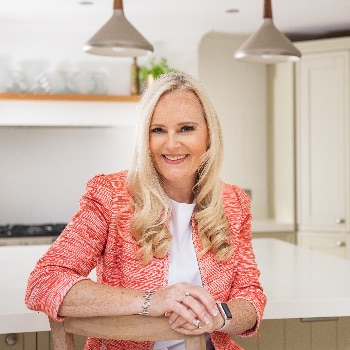20% off €35
Code:SAVE20
Guide to vitamin D for children and babies

Why do children need vitamin D? Does your baby need a supplement? Find out from expert, Sarah Almond Bushell
Summary
1Vitamin D for kids
Growing children need vitamin D to thrive. However, it can be hard for kids to get it through food alone because it’s present in very few foods and...
2Vitamin D for babies
It's essential for babies to get enough vitamin D to help their bones, muscles, and teeth strengthen and grow. That's why it’s recommended breast...
3Recommended daily Vitamin D levels – at a glance
We all need different levels of vitamin D, which vary depending on how old we are. Breastfeeding babies up to the age of one: should have a daily...
Expertly reviewed by Sarah Almond Bushell, Registered Dietician & Children’s Nutritionist
Just like adults, babies and children also need their quota of vitamin D every day to help them to grow up strong and healthy. The Department of Health recommends that all breastfed babies and children aged 6 months to 5 years are given vitamin D supplements, as well as vitamin A and vitamin C, every day.1
This guide comes with expert insight from Children’s Nutritionist Sarah Almond-Bushell, a registered dietitian and expert in children’s eating habits.
What is vitamin D?
Also known as “the sunshine vitamin”, vitamin D is essential for making sure our bones, teeth, and muscles are healthy as they develop. It also makes sure they remain healthy as we get older.
We tend to get most of our vitamin D from sunlight exposure, which starts in the UK around March and ends as autumn arrives, usually around September time. Did you know that vitamin D deficiency is one of the most common nutrient deficiencies in the world?1
In fact, some reports state that vitamin D deficiency is so widespread that it should be seen as a global public health problem.2 Given the fact it’s one of the vitamins we can all get access to, simply by being out in the sun, you might think you needn’t worry about deficiency.
According to the British Nutrition Foundation, one in five people in the UK have low vitamin D levels.3 Low vitamin D is associated with a higher risk of poor musculoskeletal health, such as rickets, osteomalacia, falls, and poor muscle strength.3
What is vitamin D good for?
Overall, vitamin D is good for maintaining good bone, teeth, and muscle health.2
Vitamin D for kids
Growing children need vitamin D to thrive. However, it can be hard for kids to get it through food alone because it’s present in very few foods and in very low levels. Pair that with a not-so-sunny climate, and most children will be susceptible to becoming deficient in vitamin D.4

That’s why the NHS recommends that all children up to 5 years are given a 10µg (microgram) vitamin D supplement. Vitamin D is sometimes expressed in IU or International Units. 400IU is the same as 10µg. Vitamin D for breastfed babies is also important. They should be given a supplement containing 8.5-10mg of vitamin D too, but we’ll get on to that below…
How to give your child more vitamin D
Fortified foods such as some breakfast cereals, soy products, and orange juice contain extra vitamin D. You can find it naturally in oily fish, red meat, and mushrooms, too.
You can also boost your child’s vitamin D levels by encouraging them to play outside in the sunshine for 10 minutes per day. That’s after you cover them in sun cream, of course – no matter the weather. But what if your child spends a lot of time inside?
The best solution is to follow the government health guidelines: they recommend a daily supplement (10µg) every day. Don’t worry, your child can’t get too much vitamin D with a combination of a daily supplement, sunshine, and fortified foods.
The best vitamin D supplements for kids
It can be a little tricky to get kids to take their supplements. But, thankfully, manufacturers have found ways to make their products more appealing to our little ones.
Vitamin D dosage for kids
Children aged one to five years should be given a daily supplement containing 10µg of vitamin D.4 However, the NHS recommends that everyone above five also considers taking a vitamin D supplement during the autumn and winter months.
Vitamin D for babies
It's essential for babies to get enough vitamin D to help their bones, muscles, and teeth strengthen and grow. That's why it’s recommended that breastfed babies are given a vitamin D supplement – even if their mother is taking one, too.
However, you should know that infant formula is already fortified with vitamin D. Babies who are fed more than 500ml of infant formula a day should not be given a vitamin D supplement.1
Why do babies need vitamin D supplements?

Up to 90% of the vitamin D in our bodies is produced in response to exposure to sunlight.4 Most babies are kept inside, or covered up from direct sunlight. It's unlikely that your new baby gets enough sunshine on their skin to stimulate vitamin D production.
The other 10% comes from a varied diet including oily fish, and very small babies won’t be getting their hands on that. Public Health England recommends that babies under one year old are given a daily 8.5-10µg vitamin D supplement.6
Worried about giving your baby or child supplements?
Vitamin D supplements for babies and children have been formulated with little bodies in mind and are perfectly healthy.
To put your mind at rest, read the label carefully so you are confident that you understand the dosage. Then, make sure to stick to the recommended dose and keep a careful note of when you give your baby or child the supplement. Don't give them two supplements which contain vitamin D (cod liver oil and vitamin drops, for example).
Is my child deficient in vitamin D?
Many people with vitamin D deficiency don’t show any symptoms. However, your child could be low in vitamin D if you notice:
- muscle weaknesses or cramps
- bone pain
- they’re often tired
- they feel consistently down or depressed7
How is vitamin D deficiency treated?

Once you have spoken to your doctor about your concerns, they will carry out a blood test to confirm whether your child is deficient in vitamin D.
Children of different ages require different amounts of vitamin D per day and your doctor will be able to provide you with tailored advice and arrange follow-up appointments to check how things are going in the coming weeks and months.
Recommended daily Vitamin D levels – at a glance
We all need different levels of vitamin D, which vary depending on how old we are.
- Breastfeeding babies up to the age of one: should have a daily supplement of 8.5 to 10 micrograms (µg)4
- Babies that are fed infant formula: shouldn't be given a vitamin D supplement if they are having more than 500ml of infant formula a day. Infant formula is fortified with vitamin D and other nutrients1
- Children aged from one to four: should be given a daily supplement that contains 10µg of vitamin D4
- Everyone aged five upwards: is recommended to take a daily 10µg vitamin D supplement in the autumn and winter months8
The advice in this article is for information only and should not replace medical care. Please check with your GP or healthcare professional before trying any supplements, treatments or remedies. Food supplements must not be used as a substitute for a varied and balanced diet and a healthy lifestyle.
- https://www.nhs.uk/conditions/baby/weaning-and-feeding/vitamins-for-children/
- https://www.ncbi.nlm.nih.gov/pmc/articles/PMC4018438/
- https://archive.nutrition.org.uk/healthyliving/helpingyoueatwell/vitamind.html
- https://onlinelibrary.wiley.com/doi/full/10.1111/nbu.12349
- https://www.nhs.uk/conditions/baby/breastfeeding-and-bottle-feeding/breastfeeding/how-to-stop/
- https://www.gov.uk/government/news/phe-publishes-new-advice-on-vitamin-d#
- https://www.nuh.nhs.uk/vitamin-d-deficiency-in-children/
- https://www.bupa.co.uk/newsroom/ourviews/vitamin-d#



.png)
